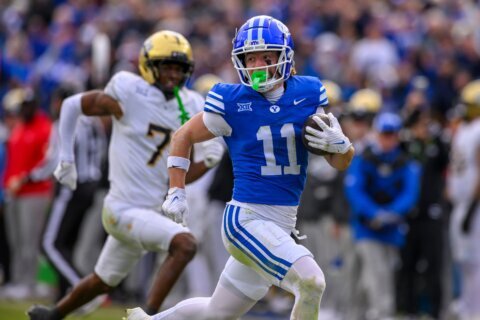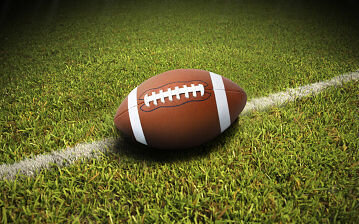Two Aspen Institute panels looking at NCAA name, image and likeness (NIL) legislation on Tuesday might as well have taken place in alternate universes, rather than one after the other on the same stage.
While NCAA President Mark Emmert posed for a pre-event photograph with Ramogi Huma, executive director of the National College Players Association, the two did not sit down to speak together. Instead, Emmert was interviewed solo by longtime college sports reporter and current editorial director of Aspen’s Sports and Society Program Jon Solomon.
The issue at hand has played out in the courts over the last several years, and revolves around whether college athletes should be able to make money from their own NIL, as any other college student — or adult — in America can.
The NCAA has long held an exception to those NIL rights and has profited handsomely from it, clearing $1 billion in revenue for the first time a few years ago. But Emmert didn’t bring any solutions to the stage Tuesday, just promises that the NCAA was working toward them.
Following the interview, Emmert — who met with senators Mitt Romney, R-Utah, and Chris Murphy, D-Conn., before his appearance at the Aspen Institute — walked offstage, dodged the press gaggle gathering to speak to him and bolted, saying he had a plane to catch.
He was out of the building before the next set of speakers could begin to challenge and dismantle every point he’d laid out.
Athlete compensation for NIL seems to be a rare instance where conservative embrace of the free market and liberal affinity for labor protections collide, giving Washington a rare bipartisan coalition of support.
One of the people who followed Emmert was Rep. Mark Walker R-N.C., who recently introduced a bill on college athlete NIL in Congress. After watching the NCAA try to avoid the halls of power, Walker seemed reticent to believe the organization actually wants to bring about change.
Walker cited ESPN college basketball analyst Jay Bilas, quoting the frequent NCAA critic’s words from a conversation the two had: “The NCAA will talk a good game, but rarely will they actually get things done.”
Walker said Tuesday that Emmert has refused multiple requests to meet with him personally on the issue.
The NCAA has largely done its utmost to avoid reform except where states have forced action, like with California’s recently-passed NIL bill, set to go into effect in 2023. A number of other states have similar bills in the works, provoking the NCAA to turn to federal lawmakers to step in and create national statutes instead.
But Ramogi Huma, executive director of the National College Players Association, warns that any participation the NCAA has in the process will be to the detriment of the athletes.
“If Congress rolls anything NIL back, that’s an NCAA bill,” said Huma.
When asked if money would be a permissible benefit, Emmert said maybe — under the condition that “it can be done in a way that can fit within those principals.”
But Huma said these ideas are at odds with one another, and further, that those principals aren’t properly enforced even now, with Olympic athletes operating under different structures that allow them to take home large sums of prize money while still competing in college.
“For the NCAA to pretend that there’s uniformity now, it wouldn’t hold up in court,” said Huma.
Emmert also insisted that any payment structure must avoid an employee/union model. But in a later panel, University of New Hampshire sports law professor and Sports Illustrated contributor Michael McCann threw some water on that idea. Instead, he put forth the concept of a trade association for athletes that would not require them to be classified as university employees.
For now, Walker’s bill is tabled, awaiting the next move from the NCAA, which may come after member presidents meet before the NCAA national convention in January. But he won’t wait long — he’s not running for reelection in the House, which means he’s got only 13 months to see to it that it passes.
Whatever happens next, it seems likely that it will come through Washington one way or another.






